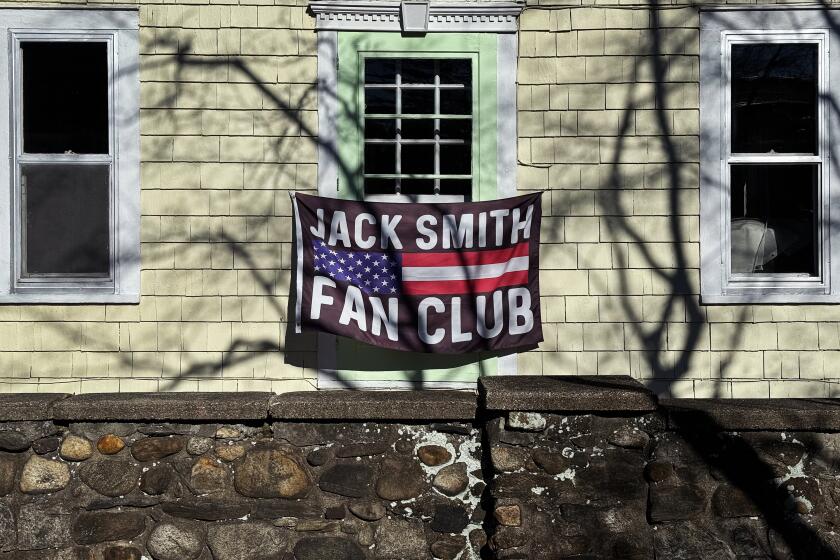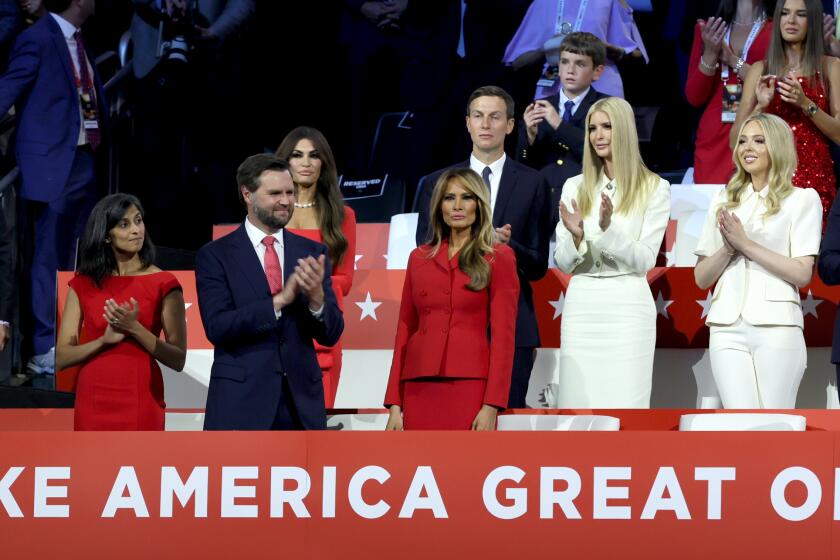Bush Closes In on Lawmakers’ OK to Use Force
President Bush lobbied hard Friday for congressional approval to use force in the Persian Gulf crisis, and appeared to have amassed the support he needed on the eve of a momentous weekend vote.
Bush challenged lawmakers, telling them it was “in your hands” to persuade Saddam Hussein of U.S. resolve.
And legislators on both sides of the Capitol clearly felt the weight of their decision whether to authorize Bush to use force after Tuesday, the deadline set by the United Nations for Hussein to pull his troops out of Kuwait.
“It’s a soul-wrencher,” said Rep. Henry Hyde, an Illinois Republican who said he would side with Bush. Both chambers debated late into the night Friday.
Congressional leaders and Administration officials said they expected that Bush would prevail in both houses in votes expected to begin on Saturday. But it appeared that any White House victory would be far narrower than the overwhelming consensus Bush has said he wants.
Against increasing odds, Senate Democrats pressed their case to deny Bush immediate authority to use force. They want to give economic sanctions more time to force an Iraqi withdrawal.
“What guarantees do we have that war will be brief, or that American casualties will be light?” said Sen. Sam Nunn (D-Ga.). “No one can say whether war will last five days, five weeks or five months.”
And Sen. John Kerry (D-Mass.) said the country appears bent on war less because it is right than because it can win.
“We think we can get it over with an acceptable level of casualties. So we seem willing to act . . . with more bravado than patience,” he said. “It sounds like we are now risking war for pride, not for vital interests.”
In the House debate, Rep. Lee H. Hamilton (D-Ind.) predicted that “anti-Americanism will rise” if the country wages war in the Middle East, and “terrorism will increase. Radical Islamic forces will be strengthened.”
“If war comes, it will be difficult to imagine where Americans will be safe in the Middle East in the years to come.” said Hamilton, chairman of the House Foreign Affairs Middle East subcommittee.
Sen. Alfonse M. D’Amato (R-N.Y.) demanded to know how long sanctions should be given to work. “Saddam Hussein is a winner” if Bush’s plea is rejected, he said.
Late in the day Friday, Sen. John W. Warner (R-Va.) formally introduced the resolution supporting Bush’s bid to use force, and an Administration official said the votes had fallen into place to pass it in the Senate. Bush worked through the afternoon placing individual calls to senators to solidify support.
“A narrow win is not a big help to the policy,” said Hyde. “But it’s better than a loss.”
Senate debate was interrupted at one point by demonstrators in the gallery. “No blood for oil! No war for Bush!,” they shouted before police officers hustled them off in plastic handcuffs. At the same time, protesters lay in mock body bags on the Capitol’s snow-covered east lawn, and other demonstrators blocked Pennsylvania Avenue in front of the White House.
Twelve were arrested at the Capitol, one at the White House.
Constituents took an intense interest in the debate, which was being shown nationally on public television. The Capitol switchboard logged more than 400,000 calls on Thursday, about twice the usual volume, and the tally was expected to be even higher on Friday.
“I think people are quite sober about this decision because they sense that the President does have a majority, and come Jan. 15 he will in fact initiate war,” added Rep. Matthew F. McHugh (D-N.Y.), an opponent of granting war authority.
Meanwhile, the United States and Iraq revved up their war rhetoric Friday, with Secretary of State James A. Baker III telling U.S. combat pilots “we pass the brink” in four days and Hussein bragging of how ready his army was.
The Iraqi president said American GIs expecting “to perform acrobatics like Rambo movies” would lose against his battle-hardened troops. He repeated his threat to use every weapon he has if war comes, and renewed his demand that the Palestinian issue be linked to any settlement.
Hussein’s tough talk diminished hopes that U.N. Secretary-General Javier Perez de Cuellar would succeed in what may be a final attempt to persuade Iraq to quit Kuwait before the U.N.-set deadline of Jan. 15, or risk military force to make it leave.
Perez de Cuellar arrived Friday in the Middle East after picking up European support for his peace mission. He was expected to meet Hussein in Baghdad on Saturday.
Soviet President Mikhail S. Gorbachev telephoned President Bush on Friday and White House spokesman Marlin Fitzwater later said the Kremlin was pursuing new diplomatic avenues in hopes of resolving the Persian Gulf crisis.
Bush told reporters Gorbachev was “thinking innovatively,” but did not elaborate. He said Gorbachev called him “in the true spirit of consultation.”
U.S. Charge d’Affaires, Joseph C. Wilson and five other U.S. diplomats in Baghdad packed for departure Saturday on a chartered Iraqi Airways jet for Frankfurt. The embassy will technically remain open and the American flag will continue to fly, but there will be no official U.S. presence in Iraq’s capital.
The U.S. Embassy in Israel urged tens of thousands of Americans in the Jewish state to leave, citing increased tensions as the Jan. 15 deadline nears.
Eight more American warships entered the Persian Gulf, and the United States agreed to send its most sophisticated defensive surface-to-air missile to Turkey -- Iraq’s northern neighbor and the site of a possible second front in a war against Baghdad.
Baker told Air Force pilots in Saudi Arabia they “would not have to wait much longer” to find out if they will be called to battle Baghdad. He said he could not give them a definitive answer, but added:
“Just so there is no misunderstanding, let me be absolutely clear: we pass the brink at midnight Jan. 15.”
At Baker’s request, Saudi Arabia pledged to bear 40% to 50% of the military costs for the multinational buildup in the gulf. U.S. and Saudi officials refused to disclose the amount promised. Baker later arrived in Egypt for talks there.
Hussein gave no sign of flexibility in a defiant speech to 500 Muslim scholars at a conference in Baghdad. Referring to Iraq’s 1980-88 war with Iran, he said his troops “have eight years of experience in war and combat” and could withstand attack by the U.S-dominated multinational force.
“The Americans will come here to perform acrobatics like Rambo movies. But they will find here real people to fight them.”
Hussein’s speech was interrupted by applause and calls for “defeating the infidels.”
Perez de Cuellar arrived in Jordan after meeting in Geneva with foreign ministers of the 12-nation European Community. He won their support for his plan for a U.N. peacekeeping role in the gulf region if Iraq leaves Kuwait.
The U.N. chief said he was not bringing a specific plan, but was exploring the idea of U.N. supervision of a simultaneous pullout of Iraqi troops from Kuwait and U.S. and allied forces from Saudi Arabia.
Officials in Washington said Bush is sending Deputy Secretary of State Lawrence Eagleburger to Israel soon to reassure its leaders about U.S. support in case of an Iraqi attack.
The State Department said Friday it has evidence that terrorists supported by Iraq plan attacks around the world if war breaks out. Spokesman Richard Boucher said the Middle East and Europe are the most likely target areas but the government also knows of terrorist plans in Africa, Asia and Latin America.
More to Read
Get the L.A. Times Politics newsletter
Deeply reported insights into legislation, politics and policy from Sacramento, Washington and beyond. In your inbox three times per week.
You may occasionally receive promotional content from the Los Angeles Times.










